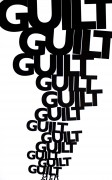The Connection Between Mental Illness and Guilt
Guilt. I hate that word. I hate the feelings that attach itself to it and the times in which I felt that my mental illness, the actions resulting from it, hurt other people. Hurting those I loved felt like the worse sort of guilt. Like being punched in the stomach and unable to breathe. Guilt is not just a word nor a feeling: When you live with a mental illness it can come to define your life. It can become dangerous.
What is the Definition of Guilt?
 Let's refer to the Mecca aptly known as Wikipedia to define a complicated word and emotion:
Let's refer to the Mecca aptly known as Wikipedia to define a complicated word and emotion:
"Guilt is a cognitive or an emotional experience that occurs when a person realizes or believes—accurately or not—that he or she has compromised his or her own standards of conduct or has violated a moral standard, and bears significant responsibility for that violation. It is closely related to the concept of remorse."
Alright, that makes sense, it looks correct on paper but it feels a heck of a lot different...
Why Might We Feel Guilt When We Live With a Mental Illness?
 I could write a few books on this and I am certain you could as well, but to narrow it down, when you live with a mental illness you might feel guilt because:
I could write a few books on this and I am certain you could as well, but to narrow it down, when you live with a mental illness you might feel guilt because:
- Your behavior, pre-diagnosis or when working to become well, hurt people you love.
- You may feel may feel that the diagnosis of mental illness will scare people away.
- You may need to apologize to people you love, or to employers, and it's difficult to explain that your actions were, in part, a result of an untreated illness.
- Simply being told you have a chronic illness causes feelings of guilt and shame.
The reasons why those of us who live a mental illness feel guilt are numerous and it can be hard to figure out why we feel the way we feel, but we can take time to figure out how we can move away from the emotion and embrace our life and work to recover. Self-care can be exceptionally helpful when working through feelings of guilt.
Using Self-Care to Recover From Feelings of Guilt
It's important to point out that everyone has feelings of guilt from time to time. It allows us to feel humility and work through our problems, but when recovering from mental illness guilt can take on a life of its own and self-care can help us move on.
Throughout my journey with mental illness I have used self-care practices such as:
- Sitting down and exploring why I feel guilt. Is it because I feel I have hurt people? If so, how can I work to recover the relationships?
- Talking to other people. My mental health care team, family and friends. More often than not they tell me my feelings are a little misplaced. Sure, my feelings are normal but, they tell me, they have recovered from them and moved on.
- Learning to accept the feelings of guilt and move past them.
It's a complicated feeling but working to understand it allows us to recover from our mental illness.
APA Reference
Jeanne, N.
(2012, October 25). The Connection Between Mental Illness and Guilt, HealthyPlace. Retrieved
on 2026, January 30 from https://www.healthyplace.com/blogs/recoveringfrommentalillness/2012/10/the-connection-between-mental-illness-and-guilt
Author: Natalie Jeanne Champagne
I feel guilty all the time. I have suffered depression for Years and have been made fun of for it. If a person has never experienced being depressed or feeling guilty or even being made to feel guilty than they do not understand. I only let people I trust to know about me...when it gets bad I will lock myself into room because I'm afraid of saying something to hurt someone's feelings ...when I get in what I call my "moods"iI think its best for me to be alone. My Dr have me on medicine to help with depression and spells of crying uncontrollable. I try to enjoy life one day at a time. I was reading your article and relating to a lot of it.
Thank you for this post,it is very informative,and useful indeed.I am glad that you have found ways in which to deal with guilt feelings in this way,and being able to share with others is also a wonderful thing to do.I also think sometimes the word should, SHOULD actually be removed from the dictionary,as when we think we should or are told we should do this or not do that,then this also brings about guilt feelings.Therefore within the confines of my own long lasting severe mental illness,where upon blame gulit and so on are always at the fore front,as in sometimes I have felt guilty just for breathing,I have to find ways also in which to make these feelings back off,let ME think about what I have to feel any gulit over and then proceed to a stage where I can feel ok about self,and accept self just as I am.Guilt is ok and fine when one has done or behaved in a manner,that may predipose one to it,but the burden of unnessary guilt can be very hard for those just recently recovered.Thank you for this post,and I wish you well with further reovery,and much better times ahead. Well done for getting where you are and best wishes to you always.
I lived with guilt most of my life and how it effected my relationship with women , to my phobias, to the fact that it cost me 2 years of schooling being 2 yrs behind, plus bullied and being politely discriminated against because of it. I didn't even know my diagnosis until I was a 50 year old man.